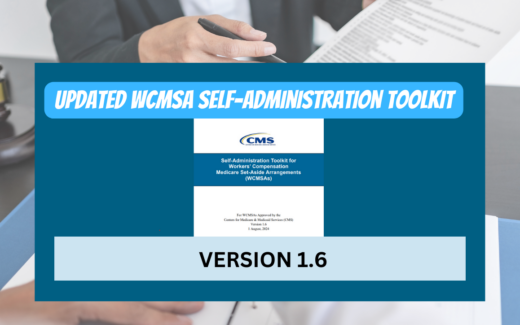On August 1st, 2024, Medicare added language to its Workers' Compensation Medicare Set Aside Self-Administration guide instructing injured workers administering their WCMSA funds that they "must" contact their Medicare Advantage Plan (MAP) and share details of their WCMSA or risk getting their benefits potentially "delayed or cancelled." Medicare also added a new section to its WCMSA Reference Guide to similar effect. At the core of the updates is guidance for more information to be shared with Medicare Advantage Plans so that they avoid being primary payer on claims that a WCMSA should have covered instead.
An Additional WCMSA Post-Settlement Requirement for Injured Workers
This update creates another significant requirement for an injured worker to keep up with after settlement. It's no wonder Medicare "highly recommends" professional administration in its WCMSA Reference Guide (Sec. 17) so that an expert can help injured workers navigate these complex issues.
As a result, injured workers, attorneys, and payers may think twice about having the injured worker self-administer their own funds with this added reporting responsibility. The new guidance requires the injured worker to annually inform their Medicare Part C/D plans of their Workers' Compensation Medicare Set Aside (WCMSA), as their plan coverage may change year-to-year, and to inform the plans of changes in medications and treatments related to the injury (which can also change over time). This guidance also instructs that the Medicare Advantage Plans have authority to recover funds on claims the WCMSA should have paid. This is an especially significant update as Medicare Advantage Plans now constitute 51% of Medicare enrollment (Kaiser: https://www.kff.org/medicare/issue-brief/medicare-advantage-in-2023-enrollment-update-and-key-trends/)
At Ametros, we do our best to work with our members to track other forms of insurance coverage they have. With member authorization, we can assist in coordinating with Medicare Advantage and other plans to ensure benefits are not impacted.
Pertaining to WCMSA’s Medicare requires that you only use the MSA funds to pay for the entire cost of medical treatments that are A) related to your injury and B) would be covered under Medicare. The role of a professional administrator is to help beneficiaries understand what they are entitled to as part of their settlement documents and supports individuals with using their MSA funds correctly to remain compliant with Medicare’s guidelines.
Below is the updated excerpt from the updated WCMSA Self-Administration Toolkit followed by the update to the WCMSA Reference Guide to the same effect.
"You must tell your insurance plan sponsor any details concerning treatments and medications used exclusively to treat a related illness or injury, so they can avoid making primary payment in the future. The Centers for Medicare and Medicaid Services (CMS) requires your plan to contact you or the administrator of your WCMSA to find out which expenses are covered by your WCMSA. The plan must avoid paying for expenses that are included in the WCMSA. The plan has a responsibility to recover any payments it made that should have been paid by the WCMSA. If you do not respond to your plan’s investigation efforts, your coverage may be delayed or cancelled.
If you are enrolled in a Medicare Advantage or prescription drug plan, please contact your plan to discuss your WCMSA, if you have not already done so."
- (Sec. 4 of the WCMSA Self-Administration Toolkit)
Updated Section of the WCMSA Reference Guide
4.1.3 Other Health Coverage, indicates that a WCMSA is still recommended when you have coverage through other private health insurance, the Veterans Administration, Medicare Advantage (Part C), or Medicare Prescription Drug Program (Part D). Other coverage could be canceled or you could elect not to use such a plan. A WCMSA is primary to all Medicare coverage related to your settled illness or injuries and must be exhausted before using other Medicare benefits on your WC illness or injury.
CMS notifies Part C and D plan sponsors that a WCMSA has been approved and instructs plan sponsors to conduct Medicare Secondary Payer (MSP) investigations. However, CMS does not relay WCMSA details to plan sponsors. Instead, CMS instructs plan sponsors to seek WCMSA coverage details from the WCMSA administrator as part of the plan sponsor’s investigation. When possible, Part C and D plan sponsors are required to avoid paying for expenses that should be covered by a WCMSA. When a settlement is reached, the settlement details dictate who is responsible for ensuring Medicare (Parts A, B, C, and/or D) is repaid for any conditional payments associated with the WC illness or injury. If the settlement does not identify funds for past debt, CMS considers those debts up to the date of settlement to belong to the WC insurer. Recovery may be sought from any party receiving inappropriate payment on behalf of the beneficiary. The administrator must provide details concerning treatments and medications used exclusively to treat a related illness or injury to the plan sponsor so the sponsor may avoid making primary payment in the future.
Note: Ametros can assist injured individuals in communicating with their Medicare Advantage plan regarding their MSA post-settlement, but only upon request and with their permission. It is important for representatives of the individual, such as their attorney, to explain this requirement prior to settlement to ensure they understand their obligations to Medicare and in the case of having their MSA professionally administered, to request support if needed.
If you have any questions, please reach out to us! If you have a future medical case that may require Ametros’ professional administration expertise, please provide a few details with our referral form.
For more information, please contact John Kane, AIC, MSCC, CMSP-F, Sr. Vice President, Strategy or Jayson Gallant, Vice President, Strategic Partnerships at Ametros.

